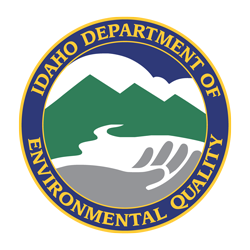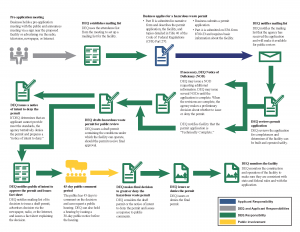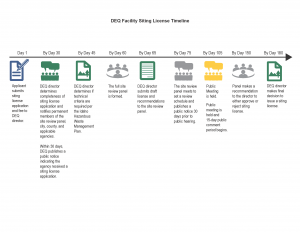DEQ issues permits and certifications for certain types of facilities that treat, store, or dispose of wastes as well as for ore processing facilities that use cyanide in their mineral extraction processes. DEQ also oversees these permits and ensures the facilities meet and comply with all applicable laws and permit conditions.
Landfills are areas of land or excavations in which wastes are placed for permanent disposal. Certain regulations apply to all municipal solid waste landfills in the state, while others such as ground water monitoring requirements are based on the volume of waste managed. All nonmunicipal solid waste landfills are regulated on the basis of volume and characteristics of waste managed and classified as Tier I, II, or III facilities. Responsibility for regulating municipal and nonmunicipal solid waste landfills in the state is shared between DEQ and the seven public health districts in Idaho.
Cyanidation is a method of extracting metals from ore using a cyanide solution. Under the “Rules for Ore Processing by Cyanidation” (IDAPA 58.01.13), ore processing facilities that use cyanide in mineral extraction processes are required to obtain a permit from DEQ for construction, operation, and closure. DEQ reviews and approves plans and specifications for all new facilities and modifications or expansions to existing facilities. This ensures that process water and process-contaminated water are safely contained, controlled, and treated to protect human health and the environment.
To obtain a permit, applicants must collect baseline environmental data; design ore processing and waste storge facilities to meet rule requirements; and develop operations, maintenance, and monitoring plans. This information is submitted to DEQ as a cyanidation permit application. For technically complete applications, DEQ develops a draft permit for public review and comment. Following public review, DEQ responds to comments and publishes the final cyanidation permit.
A Hazardous Waste Facility Permit is required for operations that:
- Treat, store, or dispose of hazardous waste received from an off-site location;
- Treat, store, or dispose of their own hazardous waste on-site; or
- Store their own hazardous waste on-site for longer than 180 days for small quantity generators, or 90 days for large quantity generators.
Only permitted facilities can receive shipments of waste on a uniform hazardous waste manifest. Learn more about the process of applying for a hazardous waste facility permit with the flow chart below.
To construct a new commercial hazardous waste treatment, storage, or disposal facility (TSDF) or expand an existing TSDF in Idaho, the owner must first submit a hazardous waste siting license to DEQ for approval. The siting license includes information about the proposed facility or expansion and details such as description of the types of waste to be handled at the facility, engineering and hydrogeologic information, and emergency and risk management information. A fee is required for each siting license application.
The siting license application requirements are found in Idaho Code § 39-58.
Hazardous Waste Siting License Application Process
The facility siting license fee schedule is provided in the “Rules and Standards and for Hazardous Waste” (IDAPA 58.01.05).
Staff Contact
Solid Waste Program Manager
Cyanidation Program Manager
Hazardous Waste Permit Supervisor



